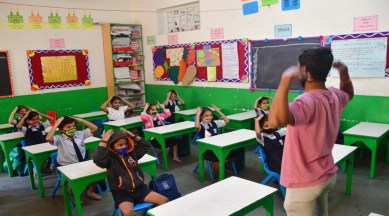Stay updated with the latest - Click here to follow us on Instagram
Covid-19 widens learning gap in West Bengal: ASER
Nobel laureate economist Professor Abhijit Banerjee said that the findings of the report should serve as a reminder that as schools reopen, teaching should be focused primarily on the existing learning abilities of children rather than grade-level curriculum.

The basic reading and numerical abilities of school children in West Bengal have substantially reduced as Covid-19 brought classroom learning to a halt for a prolonged period, according to a survey carried out among 11,189 children across 17 districts of the state.
The survey, carried out by the Pratham Education Foundation and West Bengal-based Liver Foundation in December 2021, found that only 27.7 per cent of children in class 3 could read class 2 level text, as against 36.6 per cent in 2018 and 32.9 per cent in 2014.
monthly limit of free stories.
with an Express account.
About 48 per cent of students in class 5 can read class 2 level text, down from 50.5 per cent in 2018, 50.2 per cent in 2016 and 51.8 per cent in 2014. The findings once again underlined the role of the Covid-induced disruptions in causing erosion of steady gains in learning levels made over the last decade.
Speaking at the virtual launch of the Annual Status of Education Report (ASER, West Bengal) on Wednesday, Nobel laureate economist Professor Abhijit Banerjee said that the findings of the report should serve as a reminder that as schools reopen, teaching should be focused primarily on the existing learning abilities of children rather than grade-level curriculum.
“When schools reopen, the focus should not be on grade-level teaching only. Children will make quick progress if they are made to start from where they are in terms of foundational learning,” Banerjee said.
First Karnataka, then Chhatisgarh, and now West Bengal. The findings of the Pratham Foundation-led field surveys in these states have established the need for urgent interventions to address the widening learning gaps among children. As schools reopen, focus should be on helping children who have fallen behind to catch up to minimise the risk of dropouts.
His observations were echoed by Pratham Education Foundation CEO Rukmini Banerji who shared the highlights of the report. “Before moving into teaching-learning activities at grade level, it is essential that children are given time and opportunity to develop appropriate physical, socio-emotional, cognitive, pre-math and language skills,” she said.
She said that while the survey has captured a jump in the enrollment of children in government schools in Bengal from 88.1 per cent in 2018 to 91.5 per cent in 2021, the real measure will be the number of enrolled students who return to schools after they reopen for in-person classes.
The survey found that the percentage of children in class 2 who can at least read words has dropped from 66.2 per cent in 2018 to 53 per cent in 2021. Alarmingly, it has gone below 2014 levels of 54.8 per cent.
The survey also found a decline in arithmetic levels with the percentage of children in class 1 who can at least recognise single-digit numbers reducing from 77.8 per cent in 2018 to 68.5 per cent in 2021, going far below the 2014 levels of 74 per cent.
“A drop in arithmetic ability is also visible among older children. For example, the proportion of children in class 3 who can do subtraction fell by 8.2 percentage points from 35.5 per cent in 2018 to 27.3 per cent in 2021 between 2018 and 2021,” the report said.
Among children of class 5, 25.9 per cent were found capable of doing simple division, as against 29.2 per cent in 2018. In a report released in January, based on a survey carried out in October-November 2021, Pratham Foundation reported similar learning loss in Chhattisgarh.
Previously, the ASER report of Karnataka, based on a survey in March, had painted a similar picture of widening learning gaps in the state too.
Dr Abhijit Chowdhury of the Liver Foundation, which works closely with the West Bengal government in many areas, said the findings of the survey was a clear reflection that digital education cannot ensure the holistic development of a child.